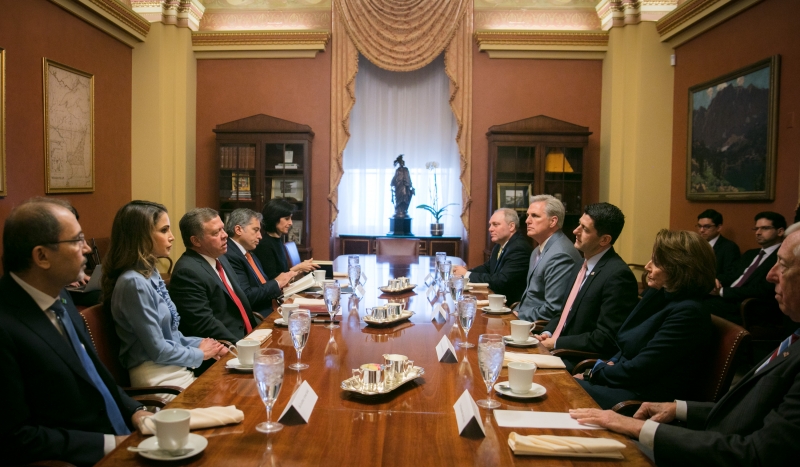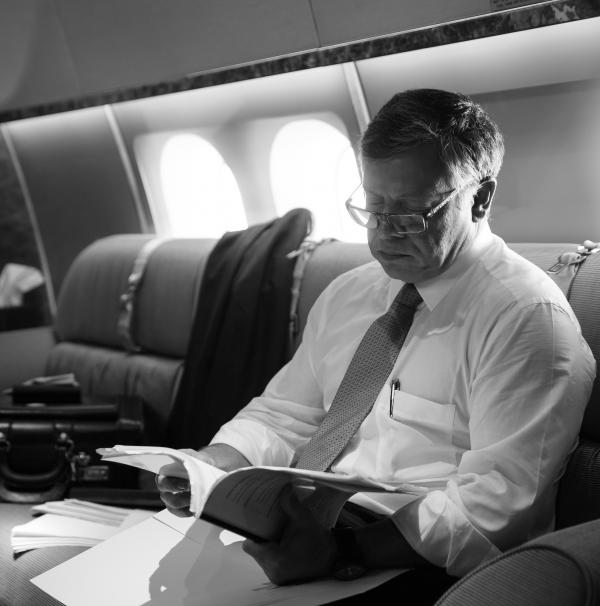King meets House leadership, Senate committee in US Congress

His Majesty King Abdullah on Wednesday continued his meetings with US Congress leaders in Washington, DC, holding talks with the leadership of the House of Representatives and the Senate’s Foreign Relations Committee.
Talks at the two meetings, attended by Her Majesty Queen Rania, covered regional developments — especially the Mideast peace process and the Syrian crisis — and efforts to combat terrorism. Discussions also addressed bilateral ties.
The US lawmakers showed great interest in Jordan’s stance on a number of regional issues, foremost of which was the Syrian crisis and maintaining the ceasefire, in addition to anti-terrorism efforts and the potential repercussions of moving the US embassy to Jerusalem.
They also listened to the King’s views on means to push Middle East peace efforts forward and how the US can further support Jordan.
His Majesty also highlighted regional issues that he sees as priorities for the coming phase to ensure stability and resolve conflicts and crises.
Discussing the Palestinian cause, the King called for refraining from policies that may add to the already growing frustration among the Palestinian people due to the halt in peace efforts.
In the case of moving the US embassy to Jerusalem, he stressed the need to consider the ramifications of such a decision and the anger it could cause among Palestinians, Arabs and Muslims.
The decision, His Majesty added, could also pose risks to the two-state solution and might end up being used as a rallying cry by terrorists.
Turning to the threat of terrorism, the King said it is not limited to the Arab region, noting that terrorism in the Middle East is closely connected to terrorist attacks and activities in other regions around the world.
The way to overcome the terror challenge, His Majesty continued, lies in bolstering international cooperation and intelligence exchange.
The King stressed that terrorism is not limited to certain nationalities or a specific foreign party; rather, it often comes from within the targeted countries and regions, especially if some minorities or groups feel marginalised and isolated.
His Majesty reiterated that Muslims are the foremost victims of terrorism; noting that what the outlaws of Islam, khawarej, are doing does not represent Islam in any way.
The King stressed that terrorists neither represent Islam nor its tolerant teachings, noting the importance of cooperation to solve the region’s issues, especially the Palestinian cause and the Syrian crisis, to counter terrorists’ attempts to export terror to the rest of the globe and present terror as war between Muslims and the West.
His Majesty advised against any measures that would be exploited by terrorists to create a situation of anger, frustration and desperation, which, he said, are the main elements of a fertile environment where extremist ideologies spread.
The King stressed the role of education to empower the peoples of the region to build their prosperous future.
As for the Syrian issue, His Majesty said that sustaining the agreed-on ceasefire would guarantee the security of the Syrian people and the launch of the peace process. Jordan, accordingly, supports efforts such as the recent Astana conference on Syria and considers the Russian role a vital one.
The King stressed the importance of cooperation between the US, Russia and the international community to sustain the ceasefire in preparation for a political solution on the basis of Geneva’s conferences.
During the two meetings, His Majesty outlined challenges that face the country due to regional crises and hosting a large number of refugees, coupled with a tough economic situation and a remedial fiscal programme that requires more aid from the international community.
They also discussed renewing the memorandum of understanding governing cooperation between the two countries and the US medium-term economic and military aid.
For their part, US lawmakers said that it is difficult to imagine the region without Jordan’s pivotal role and His Majesty’s leadership, which, they said, present wise policies that contribute to security and stability efforts in the Middle East.
Foreign Minister Ayman Safadi, King’s Office Director Jafar Hassan and the Jordanian Ambassador to the US Dina Kawar attended the meetings.
In remarks to the Jordan News Agency, Petra, Lindsey Graham (R-South Carolina), who chairs the Senate’s subcommittee on appropriations for the State Department, said the King is respected by Democrats and Republicans alike.
When His Majesty talks, Graham added, America listens.
Discussions at the meeting included a review of the US’ memorandum of understanding with Jordan, the senator said, noting that the Kingdom is one of the countries that the US has pledged to assist.
He expressed a desire to increase the aid offered to Jordan due to the increasing burden caused by hosting Syrian refugees.
Jordan, Graham added, represents the gateway to resolving issues in the Middle East.
The King, he said, is exerting efforts to empower his people, believing that peace requires inclusiveness, consensus and religious tolerance and commitment.
The US has to invest more in Jordan, the senator added, expressing his desire to seek a substantial increase to the aid presented to the Kingdom in the economic and military fields.
For his part, Ben Cardin (D-Maryland), who is a member of the Senate’s Foreign Relations Committee, said the meeting was an opportunity to speak to King Abdullah, describing him as a great leader in Jordan and the region.
The Kingdom’s commitment — through its people and leadership — to fighting extremism is highly encouraging, Cardin noted.
Discussions with the King were frank, he said, addressing US-Jordanian ties and means to combat terrorism and revive the peace process.
Citing a report by the Senate, Cardin said Jordan is committed to hosting over 1.2 million refugees, which has a major impact on the Kingdom’s economy.
Voicing US appreciation for Jordan’s efforts, he said the international community must assist the Kingdom to enable it to honour its commitment to refugees.
President of the Senate’s Foreign Relations Committee, Bob Crocker (R-Tennessee) said that in spite of the issues that Jordan deals with, especially the Syrian refugee crisis, the budget deficit and the drop in tourism, the King is still the leader that the US officials want to hear from, on how to deal the region’s issues in general.
King Abdullah presented an approach to be followed in dealing with the region, Croker said, adding that His Majesty is a valued friend of the US and so is Jordan as a state and a people.
He concluded that King Abdullah, when visiting the US, shares a valuable knowledge, expressing pleasure over receiving him at this time.


